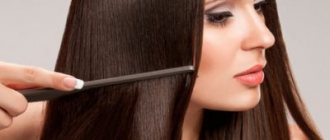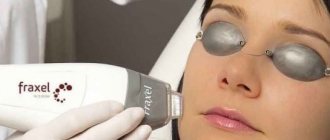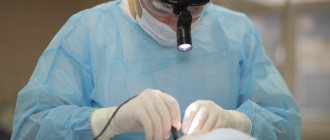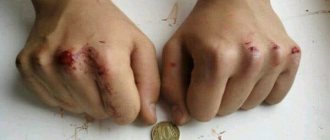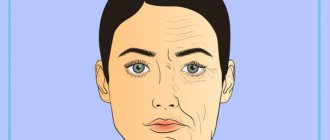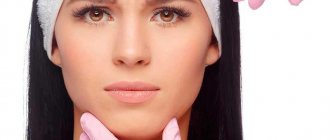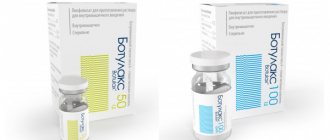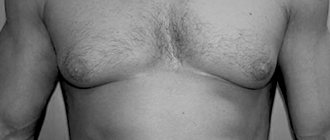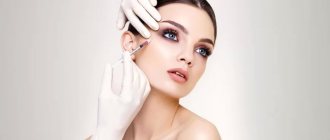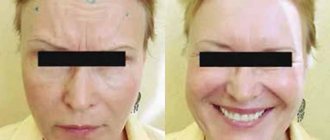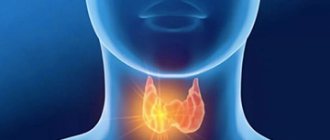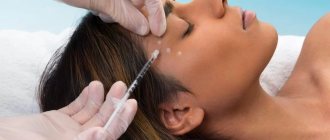Botox: contraindications to the procedure
Botox injections are a popular cosmetic procedure designed to cleanse facial skin of facial wrinkles. The Botox injection procedure can only be performed in medical institutions that have the appropriate license. Before administering botulinum toxin, it is necessary to ensure that the patient has no relative (temporary) or absolute contraindications.
Relative contraindications
At the first visit to a cosmetologist, the patient should tell the doctor in detail about previous diseases and operations, about individual reactions to cosmetic procedures, as well as about all medications, sports nutrition and nutritional supplements that she takes. Taking certain medications is a relative contraindication for Botox injections. These include:
- Tetracycline antibiotics, sulfonamides, macrolides, other antibacterial drugs.
- Non-steroidal anti-inflammatory drugs that affect the blood coagulation system (ibuprofen, acetylsalicylic acid).
- Direct (heparin) and indirect (warfarin) anticoagulants, antiplatelet agents.
If you are taking any of the medications listed above, Botox injections are possible only after you have completely stopped it. Moreover, at least two weeks should pass between the course of antibacterial therapy and “beauty injections”. If you are taking substances that affect blood clotting, botulinum therapy is carried out after normalization of hemostasis indicators, which are assessed by laboratory tests (prothrombin index, coagulogram).
Some components of dietary supplements may affect the effectiveness of the anti-aging procedure. Women who take any dietary supplements should inform their cosmetologist about this.
A relative contraindication to the procedure is the presence of signs of an inflammatory process on the facial skin: redness, rashes, swelling. Exacerbation of herpes labialis is another common temporary limitation to the administration of botulinum toxin. Injection rejuvenation is possible only after complete restoration of the skin. Patients with a history of herpetic infection, but without manifestations of viral activity, are prescribed preventive antiviral therapy before the session.
A cold, flu or acute infectious disease is also a temporary limitation to Botox therapy. It is not advisable to do Botox injections during a seasonal exacerbation of allergic rhinitis. It is also not recommended to get Botox injections at the beginning of your menstrual cycle.
Absolute contraindications
Any injection and hardware cosmetology procedures are contraindicated for patients with cancer, regardless of the location of the tumor process. Severe somatic diseases in the acute stage, that is, diseases of the hepatobiliary, respiratory, urinary or digestive systems, are also a contraindication to cosmetic procedures. During the period of remission, anti-aging injections are possible after consultation with a specialist and laboratory and instrumental diagnostics.
Bleeding disorders are another absolute contraindication to Botox therapy. The cause of disruption of the hemostatic system can be either a hereditary pathology (for example, hemophilia) or an iatrogenic disorder caused by taking medications. Such drugs are often prescribed to patients with cardiovascular diseases and chronic venous insufficiency of the lower extremities (varicose veins). If the disorder is acquired, rejuvenation with botulinum neurotoxin injections is possible after restoration of normal blood clotting parameters.
In a small percentage of patients, Botox administration leads to the development of an allergic-type response. If there is a history of hypersensitivity to the components of the drug, it is necessary to choose a different method of dealing with cosmetic defects.
Botulinum therapy is not carried out during pregnancy and breastfeeding. Facial rejuvenation is possible only after the end of the lactation period. Feeding a baby with breast milk is a contraindication to all cosmetic procedures.
Since botulinum toxin acts on nerve endings and blocks the transmission of impulses from the central nervous system to muscle fibers, Botox therapy is contraindicated in patients with myasthenia gravis. Another absolute contraindication is severe myopia.
Contraindications are also decompensation of endocrine system disease, chronic liver or kidney failure, chronic heart failure.
What is contraindicated after injections
Botulinum toxin acts locally, that is, only in the area where Botox is directly administered. It does not have a systemic effect on the body, but migration of the active component (the toxin itself) into nearby tissues is possible. Migration over short distances does not lead to side effects, but allows for a more uniform smoothing of wrinkles. Excessive migration can lead to the development of complications:
- Dry eyes or watery eyes (when correcting glabellar lines or wrinkles in the corners of the eyes).
- Impaired binocular vision.
- Lowering of the eyebrows (when smoothing out forehead and eyebrow wrinkles).
- Ptosis of the upper eyelid.
- Facial asymmetry.
- Dysphagia (impaired swallowing when Botox is injected into the skin of the lower third of the face).
The cause of side effects after Botox injections is most often the low level of qualifications of the specialist. If you entrust facial rejuvenation to a cosmetologist with extensive (at least two years) injection experience, you don’t have to worry about complications. To completely eliminate the risk of undesirable consequences and increase the aesthetic effect of anti-aging injections, follow the following recommendations during the recovery period (7-10 days):
- Take a break from sports.
- Avoid thermal procedures, including hot baths and saunas.
- You can't massage your face. It is advisable to limit the use of decorative cosmetics.
- Do not expose your skin to ultraviolet light. After Botox injections, both solarium and sunbathing are contraindicated.
- Alcoholic drinks are strictly prohibited.
The first days after Botox injections, facial muscles need to be provided with facial rest. You cannot “make faces” or express emotions through facial expressions. For the first two to three days after rejuvenating the frontal area (forehead) and eyebrow area, you should not blow-dry your head, since warm air increases blood circulation, which increases the degree of migration of botulism toxin. It is advisable not to bend over, as increased blood flow to the skin of the face is fraught with the same consequences.
The next group of prohibitions and restrictions is related to medicines and dietary supplements. After Botox injections, you should not take medications that affect the hemostatic system. These include anticoagulants, antiplatelet agents and almost all substances with anti-inflammatory activity from the non-steroidal group: ibuprofen, acetylsalicylic acid, diclofenac and others.
Antibiotics should not be taken either before or after anti-wrinkle injections. Be sure to review your nutritional supplements: take a break from taking fish oil, omega-3, omega-3-6-9, multivitamin complexes containing B vitamins and vitamin E for 1-2 weeks.
Following the recommendations for the recovery period after injections will help to obtain optimal results. You will receive detailed information about the botulinum therapy method during a consultation with a medical cosmetologist (Moscow).
The first 15 – 20 days after Botox or Dysport
Swelling may occur at injection sites. This is normal for the first weeks. Swelling is especially noticeable under the eyes, where the skin is most delicate. If you monitor your fluid intake, swelling will be minimal. Those who have everything in order with their metabolism do not need to make changes to their usual diet. Only certain metabolic disorders in the body can affect the anti-aging result. Then you will need a diet. This point needs to be clarified during a consultation with a cosmetologist.
Naturally, skin that has experienced severe stress requires special care in the first weeks. Peeling procedures cannot be done, nor can scrubs be used. This can not only increase the post-traumatic effect, but also lead to infection. It is recommended to limit yourself to masks that relieve swelling and use soothing cosmetics.
Botox/Dysport may not give such a good result if you visit baths, saunas, etc. Intense heat activates the processes of removing the drug from tissues at the stage of its fixation. It is also recommended to solve all problems with the oral cavity and teeth before injecting the drug. Partially atrophied muscles simply will not allow you to open your mouth normally during the first 2/3 weeks.
Anticonvulsants
It is believed that anticonvulsants (ACs) are prescribed only for the treatment of epilepsy. This point of view is wrong. In neurology, AK is used for chronic pain syndromes, migraines, neuropathic pain, restless legs syndrome, and also as sedative therapy.
Today, anticonvulsants are used as preventive therapy for migraines. These drugs activate the endogenous pain suppression system and reduce the sensitivity of vascular wall receptors to pain.
Side effects when taking AK:
- drowsiness;
- weight gain;
- alopecia;
- dyspepsia;
- toxic effects of drugs on the liver and hematopoietic system.
The incidence of side effects of AK exceeds 10%. That is why the doctor makes the decision to take them based on a calculation of the benefits and risks to the patient’s health.
Contraindications for taking anticonvulsants:
- pregnancy;
- lactation;
- chronic liver and/or kidney failure.
Psychotherapy
The International Association for the Study of Pain (IASP), based on research results, recognizes the treatment of headache within the cognitive-behavioral direction as more effective than medication, and therefore neurologists recommend psychotherapy as the main method. Medications are then prescribed as support to relieve symptoms. The IASP considers this combined approach to the treatment of chronic headaches to be optimal.
The cause of headaches is not cerebral vasospasm. The chronic course of the disease can be caused by emotional stress, imbalance of water in the body and diet, prolonged exposure to the sun and other personal risk factors. Cognitive behavioral therapy is designed to identify these factors and correct their effect on the body.
These tasks are within the competence of a psychotherapist (not to be confused with a psychiatrist - a specialist in the diagnosis and treatment of mental disorders). His job is to change the patient's habits, which are a potential cause of chronic disorder, and to develop new systems of thinking. The psychotherapist's assistance in the treatment of chronic headaches is also aimed at teaching the patient relaxation techniques, which prevent repeated attacks of cephalalgia. This technique in the treatment of hypertension is more effective than medication.
Today there is no universal remedy for chronic head pain - the choice of treatment method for the disease and its effectiveness largely depend on the accuracy of diagnosis. Advanced diagnostics helps to obtain a complete picture of the disease. For this purpose, specialists from GUTA CLINIC and the Center for Neurosurgery named after Academician N.N. Burdenko has developed an exclusive comprehensive diagnostic program that makes it possible to determine with a high degree of accuracy the cause of head pain and the type of cephalgia. Contact us and see for yourself!
